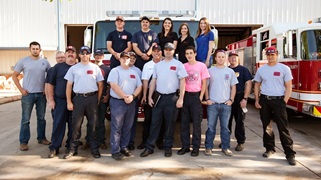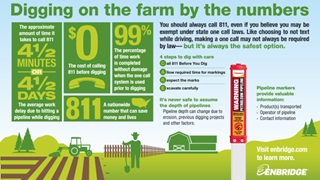Dispelling some common safe digging myths
Before you break ground, make sure you know what's below
Underneath our feet, there’s a massive and sophisticated network of pipelines and other conduits carrying crude oil, natural gas, electricity, water and even digital information.
These underground utilities travel for millions of miles, in total, across North America, and play a critical role in fueling our quality of life. Understanding where they are located, before digging or disturbing the ground, prevents damage, avoids utility outages… and, ultimately, saves lives.
Good thing there’s an easy way to do that—Call or Click Before You Dig.
But how long does calling 811 (U.S.) or visiting ClickBeforeYouDig.com (Canada) really take, and what projects should you use it for? If you’ve called or clicked once, do you ever need to do it again? Read below to learn the answers to these questions, and more, as we dispel some common myths about safe digging practices and calling, or clicking, before you dig.
Myth: 811 (U.S.) and ClickBeforeYouDig.com (Canada) are only for digging.
Fact: Calling 811 and clicking before you dig apply to all methods of ground disturbance or dirt-moving activities.
Myth: I remember when the utilities were put in and I’ve had them located before. I don’t need to call or click again.
Fact: The depth of pipelines and other utilities can change over time due to erosion, other digging or excavation projects and uneven surfaces. Please don’t make risky assumptions—you don’t want to be the neighbor who knocks out Internet, cable or vital services, or causes injury to others in the area.
Myth: I’m a farmer, railroader or a municipality employee and I’m exempt from One-Call Center notification, so I don’t need to call 811 or click before I dig.
Fact: You should always call 811 or click before you dig, even if you believe you may be exempt under state or provincial one-call laws. Like choosing to not text while driving, making a one-call may not always be required by law — but it’s always the safest option.
Myth: If I hit a pipeline and nothing happens, there’s nothing to worry about.
Fact: Even if it appears the pipeline isn’t damaged, always call the pipeline operator. Damage to protective coating, or even a small dent in the pipeline, could cause a major problem in the future.
Myth: Calling 811 or clicking before I dig will hold up my work. I don’t have time to call.
Fact: Calling 811 or using ClickBeforeYouDig.com is fast. After you call, professional locators will be sent to the proposed excavation site within two to three business days (five business days in Ontario), depending on state or provincial laws. We also suggest building the notification into your work plan—by planning ahead, you’ll be able to work efficiently and safely.
Myth: Calling 811 or clicking before I dig costs money. I’m trying to run a successful business, and every dollar counts.
Fact: Calling 811 and clicking before you dig are free—the cost is paid by utility companies to protect you and your employees or tenants.*
Myth: I’m not digging very deep. I don’t want to bother anyone for a small project.
Fact: Erosion, digging projects or uneven surfaces can affect depth of pipelines and other utilities. You’re not bothering anyone by calling or clicking. We’d rather you be safe than sorry.
April is Safe Digging Month in both the U.S. and Canada, with Common Ground Alliance and Canadian Common Ground Alliance members offering reminders about following safe digging procedures.
But on a 24/7/365 basis, before you pick up that shovel or fire up that backhoe, you should always know what’s below.
* -- Not all underground utility owners are part of the one-call system. Arrangements to locate private, secondary or customer-owned utilities must be made separately and may be subject to locate fees.










